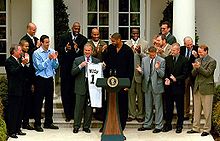 When Popovich was telling the story to Sports Illustrated recently, he said: “I really cherish that time. It was like an instant respect and understanding of each other. Almost like we were soul mates.”
When Popovich was telling the story to Sports Illustrated recently, he said: “I really cherish that time. It was like an instant respect and understanding of each other. Almost like we were soul mates.”
Although Duncan was the opposite of Robinson – a laid-back islander rather than a rigid military man – they had the same approach to basketball. Both had stayed in school for four years and both saw basketball as a small part of a much larger world. To play basketball was not about being a star; it was about making a team succeed and that was going to require an adjustment by Robinson.
“The offense was going to go less through David and more through Timmy,” Popovich said. “David knew that from Day 1, but there was never a peep from him. There was not one feeling of jealousy. He was thrilled to have Timmy next to him. Timmy handled it well, too. He deferred to David whenever he could. He always praised David to the press and rightly so. I couldn’t have been more fortunate in having two not just intelligent, but mature, stable individuals where egos did not matter. They just wanted to get the job done.”
Like Popovich, Robinson did not dream about specifics. But when he was on the 1996 Olympic team, Robinson had played an exhibition against a group of college players including Duncan. And Duncan played great against Robinson, Hakeem Olajuwon and Shaquille O’Neal. So Robinson was excited. During the summer after the 1997 draft, he invited Duncan to visit him at his summer home in Colorado. There, the two engaged in a competitive game of one-on-one basketball and, the seven-time member of the first or second NBA All-Defensive team was humbled and amazed at the same time.
“He was incredible offensively,” said Robinson, who won Defensive Player of the Year in 1991-92. “I always pride myself on being a pretty good defensive player and I felt like I couldn’t stop this guy. That was my first inkling. We sat down in Colorado and I said, ‘I’m going to be honest with you, man. My job is to put you in position to where you can succeed and you’re an incredible scorer. I’d much rather see you score than me and I’ll just play defense and rebound.’”
Robinson is a man who won a scoring title. He once scored 71 points in a game. A player of that stature embracing a complementary role is almost unimaginable. There are many stories of superstars on the same team unable to get along, vying for individual superiority rather than team success. But that wasn’t the case in San Antonio. In joining Duncan and Robinson, Gregg Popovich was as close to basketball perfection as he could get.
It also meant that Popovich could forge ahead, create a system that he truly believed in and he would find out if it worked. Because if his desire to build around defense and good character people did not result in the Spurs being in position to win a championship, then he was either a lousy coach, lousy executive or both.
“He had a base to build on,” said R.C. Buford, who joined the coaching staff in 1988 with Popovich and eventually became general manager in 2002. “Peter gave us the opportunity to establish a culture and we learned there are things that work and things that don’t work. We’ve made some mistakes and brought people in here that couldn’t make it. But ultimately it was not just the intellect of Pop, but the intellect of Tim and David that made it work.”
Popovich, as always, is self-deprecating about becoming a great coach. Before Duncan arrived and with Robinson sidelined, Popovich’s career record was 17-47. It is now [897-415].
“We thought long and hard before we drafted Timmy,” Popovich said, tongue firmly pressed against cheek. “We deserve a lot of credit for that.”
And when asked about the sense of accomplishment he felt, being the NBA’s longest tenured coach with one team and installing a system that has consistently been successful, Popovich said:
“We felt confident we were on the right track. But if you drafted Duncan after Robinson, your system would work, too.”
© 2013 Whitman Publishing, LLC
CHECK OUT JAN HUBBARD’S ARCHIVE FROM SHERIDAN HOOPS.COM. GREAT STUFF ON THE NBA THEN AND NOW.
Jan Hubbard has written about basketball since 1976 and worked in the NBA league office for eight years between media stints. Follow him on Twitter at @whyhub.
Ordering your book now! I’ve been looking around for a book dedicated to the number team in the league! Thanks for writing it!